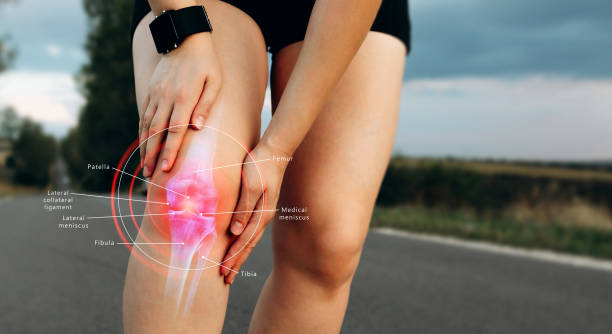 Knee replacement is one of the most successful orthopedic surgeries carried out today. It is a surgical operation also known as knee arthroplasty (Arthroplasty means surgically reconstructing a joint). This procedure is done by surgically replacing the damaged knee with an artificial joint called a prosthesis. It is an effective procedure that can increase mobility, eliminate knee pain, and improve one’s overall quality of life. Knee replacement surgery involves repairing the soft tissues and muscles around the knee, removing the worn-out cartilage, and correcting the deformity by attaching a metal prosthesis to the tibia and femur. (1)
Knee replacement is one of the most successful orthopedic surgeries carried out today. It is a surgical operation also known as knee arthroplasty (Arthroplasty means surgically reconstructing a joint). This procedure is done by surgically replacing the damaged knee with an artificial joint called a prosthesis. It is an effective procedure that can increase mobility, eliminate knee pain, and improve one’s overall quality of life. Knee replacement surgery involves repairing the soft tissues and muscles around the knee, removing the worn-out cartilage, and correcting the deformity by attaching a metal prosthesis to the tibia and femur. (1)
What is the best age to have a knee replacement?
 There is no unwavering rule about the best age limit to have a knee replacement. Older people within the range of 50 to 70 years are the most common recipients of knee replacement. They experience immense relief from the comfort and mobility offered by a prosthesis. However, there is an upsurge of cases with early osteoarthritis and other joint problems, necessitating several younger patients to become qualified for knee replacement surgeries.
There is no unwavering rule about the best age limit to have a knee replacement. Older people within the range of 50 to 70 years are the most common recipients of knee replacement. They experience immense relief from the comfort and mobility offered by a prosthesis. However, there is an upsurge of cases with early osteoarthritis and other joint problems, necessitating several younger patients to become qualified for knee replacement surgeries.
That said, the resolution to have an arthroplasty surgery does not only depend on age but on various circumstances, such as how much pain you are experiencing, if delaying the surgery could worsen the problem or if it is causing you notable disability. Some people may wait until they are 70 to undergo the surgery without a problem. For others, delaying for too long to have the knee changed might not be advisable. For example, if the knee joint debases rapidly, it may cause the surgery to be more challenging. Generally, about 80-90% of most people who opt for a knee replacement get satisfactory results with the procedure, but it’s best to discuss the advantages and disadvantages with your doctor.
To be qualified for a knee replacement, there are other factors asides from your age that your orthopedic doctor will consider before deciding if there will be a knee replacement surgery. Some of the factors are:
- If your knee stiffness and pain have reduced your ability to carry out daily activities like driving, sitting, walking, climbing, etc
- If You experience knee pain even while restingor sleeping
- If you are experiencing a worn-out joint due to a degenerative joint disease like osteoarthritis
- If there’s a severe deformity at your knee joint
- If you have not gotten satisfactory results from simpler, nonsurgical treatments like injections, medications, and physiotherapy
Irrespective of your age, if you have all the factors that require a need for knee replacement surgery, you will be advised by your orthopedic doctor on undergoing one. Also, if you are young, you will be advised to avoid doing strenuous activities, in other to increase the life expectancy of the prosthesis. This is because strenuous activities will wear out the prosthesis too early, necessitating a second knee replacement surgery, which is usually a lot harder for recovery.
 A knee joint surgery takes about two hours to be completed. Most prosthesis have a plastic and metal part while most orthopedic doctors now use various materials including ceramic on ceramic, plastic or ceramic or metal on metal.
A knee joint surgery takes about two hours to be completed. Most prosthesis have a plastic and metal part while most orthopedic doctors now use various materials including ceramic on ceramic, plastic or ceramic or metal on metal.
There are 2 major types of knee replacement surgery: Partial knee replacement – which means only one part of your joint is replaced, which means less bone is removed, minimal invasion but does not last as total replacement. In Total knee replacement surgery, both sides of your knee are replaced. You will experience better mobility and less pain, but scar tissues may occur, leading to difficulty in bending knees.
The most common reason why most people need knee replacement surgery is osteoarthritis. (A) Here are some other health conditions that damage the knee joint:
- disorders that cause unusual bone growth
- Rheumatoid arthritis
- When blood supply is inhibited at the knee joint resulting in bone death
- Haemophilia
- knee injury
- Gout
- knee deformity with loss of cartilage and severe pain
How long is a knee replacement supposed to last?
Knee joint prostheses do not last forever. In about 85%- 95% of patients, a knee replacement implant is expected to function for about 15 to 20 years, as long as you adhere to your physicians instructions.
After this period, general wear and tear begin to loosen the implant. Some factors that may facilitate a loosed implant include excessive body weight, high-impact activities, and wear of the polyethylene component. This may cause some patients to experience knee instability, pain, infections, or loose implant particles.
You might also experience redness and warmth, reduced range of motion, and swelling. (3) When these symptoms develop, your orthopedic surgeons will recommend having a revision surgery on the knee to replace the implant. Infection, especially, requires prompt revision surgery to fix the loose knee implant.
In conclusion, there is no defined age limit for knee replacement surgery. Anyone can qualify for surgery based on numerous factors earlier stated above. If the benefits outweigh the risk, your doctor will want you to go ahead with the surgery. For many people, a knee replacement provides improved mobility, pain relief, and a better quality of life.
Generally, Four to six weeks after a knee replacement surgery has been done, you can resume daily activities like light housekeeping and shopping. You are expected to avoid higher-impact activities — such as skiing, tennis, jogging, and sports that involve jumping. You can engage in various low-impact activities, such as swimming, golfing, biking, and walking. If you have questions concerning your knee joint or you are considering a knее replacement surgery soon
kindly speak with orthopedic surgeons аt Grеаt Lakes Orthopaedics, Gаrdеn Cіtу, MI.
DISCLAIMER: Please, note that all the information provided on the webpage is strictly for informational purposes. This article is not to used as a substitute for any professional medical care – diagnosis, treatment or advice. Please, ensure you seek the advice of your doctor or other healthcare providers if you have any questions or concerns regarding your health.
References




